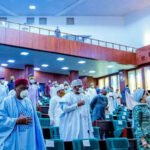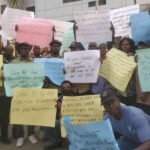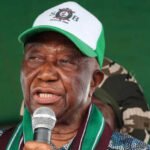Nigeria’s president, Muhammadu Buhari, recently made a comment that his administration has ‘been incrementally increasing funding’ to the education sector since 2015.
The president spoke through the Minister of State for Education, Goodluck Nanah Opiah, at the seventh convocation ceremony of the Federal University, Oye, Ekiti State.
He was quoted as saying that his administration has done its best within the limits of available resources to better Nigeria’s position in the comity of nations in the area of education.
‘It is a matter of public knowledge that my administration, since its inception in 2015, has been incrementally increasing funding to the sector in its yearly budgets’, he noted.
‘The university system has remained one of the largest beneficiaries of budgetary allocations to the sector.
‘Notably, through increased funding of the Tertiary Education Trust Funds (TETFUND), my administration has regularly financed human capital and infrastructural development across Nigerian universities’.
Funding gap in education sector
Development Diaries reports that Nigeria’s budgetary allocation to education has never reached the recommended minimum of 15 percent by the United Nations Educational, Scientific and Cultural Organisation (UNESCO).
The education budget allocation in 2015 was 10.79 percent; in 2016 – 7.9 percent, in 2017 – 6.1 percent, in 2018 – 7.1 percent, in 2019 8.4 percent, in 2020 – 6.5 percent, in 2021 – 5.7 percent and in 2022 – 5.4 percent.
Furthermore, Nigeria’s current education budget for 2023 is 5.39 percent of its total budget of N21.83 trillion, a 50 percent reduction from what was budgeted for education in 2015.
Data from the World Bank shows that despite being the second richest country in Africa, Nigeria spends less on education than all but one (Somalia) of the ten poorest African countries.
It is evident that the budgetary allocation to the sector since the commencement of President Buhari’s administration still struggles to meet the UNESCO recommendation.
President Buhari, at the ‘Transforming Education Summit’ which took place in September 2022, had proclaimed Nigeria as a champion country and committed to greater inclusiveness and innovation for education in the country.
Development Diaries also reports that in 2015, Nigeria signed a commitment to achieve the United Nations Sustainable Development Goal (SDG) four, to ‘ensure inclusive and equitable quality education and promote lifelong learning opportunities for all’, by 2030.
The federal government has committed to spending four percent of its GDP and 22.5 percent of its national budget on education by 2025 and beyond.
Unfortunately, this is far from reality in the country as the budgetary allocation for education in 2023 is Nigeria’s lowest in the last ten years.
Contrary to what the president said, Nigeria’s education sector is still struggling to improve in the eighth year of his administration.
The Buhari administration is about to come to an end, hence, the call to action would be for the incoming administration to strive towards better funding for Nigeria’s education sector.
The federal government needs to focus on going up in terms of budgetary allocation to the sector in order for Nigeria to achieve a 12-year free education status, thereby reducing the number of out-of-school children in the country.
Photo source: Muhammadu Buhari






